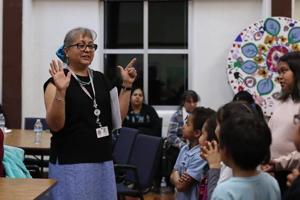Vista Grande High Adjusts Calendar to Support Taos Pueblo Culture

In a significant move to support cultural practices, Vista Grande Charter High School in Taos has modified its academic calendar for the 2023-2024 school year. Classes, which typically commence in mid-August, began on September 2, 2023, allowing students from Taos Pueblo to fully engage in their annual cultural activities without having to choose between their education and tradition.
Historically, Taos Pueblo students faced a tough decision each year: start school on time and miss out on important Pueblo practices or begin classes late. This new initiative was driven by input from community leaders, including Mary Alice Martinez, the Tiwa Language Program Director, and Jim Smith, the director of Vista Grande High School. “We hope this is not only supportive of our students, staff, and families coming from Taos Pueblo, but that it can also be a conversation starter within the community in general,” Smith stated.
This change is part of a broader effort by Vista Grande to promote cultural sensitivity and provide programs aimed at preserving cultural identity, including the Tiwa Language Program. Tiwa, a dialect spoken by the Taos Pueblo community for centuries, has been classified as endangered by UNESCO. With an estimated 800 native speakers, mostly older adults, the struggle to keep the language alive is critical.
“Who knew we’d be at the point where we’re on the verge of losing our language?” asked Michelle Concha, a Tiwa instructor at Vista Grande High. She expressed concern that without immediate action, Tiwa could vanish within the next few generations. The Tiwa Language Program, launched in 2018, was developed with the assistance of local educators and the University of New Mexico. It aims to provide a comprehensive curriculum that emphasizes language immersion, cultural relevance, and community engagement.
The program has expanded significantly, now offering classes across various educational levels within Taos Municipal Schools. Students who demonstrate proficiency in Tiwa receive a seal of recognition on their high school diplomas, which counts for bilingual credit. Concha humorously noted, “It’s considered a foreign language credit. They should change it to a heritage language or something.”
Language is integral to culture, and Tiwa embodies the Pueblo way of life, featuring unique greetings and expressions tied to traditional narratives. “Without our language, we don’t have our culture, and without culture, we don’t have our language. It goes hand in hand,” said Martinez. The Tiwa program’s success hinges on language immersion, which fosters a deep connection between students and elders.
Elders often express joy when witnessing children speak Tiwa, a sign of cultural continuity that reinforces the importance of language. Despite the challenges of dwindling speakers, there is hope. The first cohort of students who began learning Tiwa in elementary school is set to graduate this year, a testament to the program’s effectiveness. Additionally, plans for a Tiwa honors program at Taos High School are underway.
Inspired by their heritage, students like one 11th grader aspire to blend Western science with the Tiwa worldview, reflecting the program’s goal of integrating cultural knowledge with academic learning. “Our people were scientists as well as mathematicians,” Martinez noted, highlighting the sophisticated understanding of nature and astronomy inherent in Pueblo life.
Tiwa is one of three main dialects of the Tanoan language family, alongside Tewa and Towa, and is unique in its oral tradition; there is no written form. To preserve this tradition, a resolution from Taos Pueblo’s Tribal Council prohibits written instruction in classrooms, presenting both challenges and opportunities for Tiwa instructors. Effective teaching methods incorporate visual aids, oral repetition, and hands-on cultural projects, helping students connect with their heritage in engaging ways.
Concha and Martinez, siblings who were raised as first-language Tiwa speakers, emphasize the importance of family and community in language preservation. They hope to establish a K-12 immersion school at Taos Pueblo, similar to existing programs in New Mexico. “It’s time they start looking at our point of view,” Martinez stated, underscoring the need for educational systems to adapt to cultural contexts.
Support from local school districts has proven vital in this initiative. Taos Municipal Schools has designated cultural days off, including the upcoming San Geronimo Feast Day, while Vista Grande has extended its school year to accommodate the late start. The impact of the landmark Yazzie/Martinez education lawsuit has also been significant, as it mandates that schools address the needs of Indigenous and disadvantaged students.
Every time a child speaks in Tiwa, it signifies a step toward preserving a language that is not just a means of communication but a vital link to cultural identity. “They can feel like they’re part of our community,” Concha remarked, reflecting on the profound implications of language for the future of Taos Pueblo. The program continues to foster hope and resilience, ensuring that the Tiwa language and the rich culture it represents are not forgotten.






